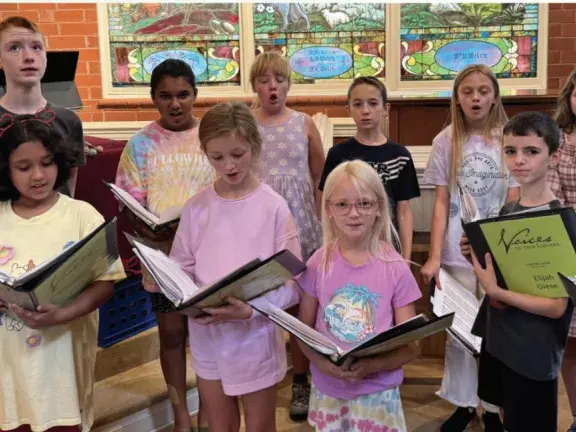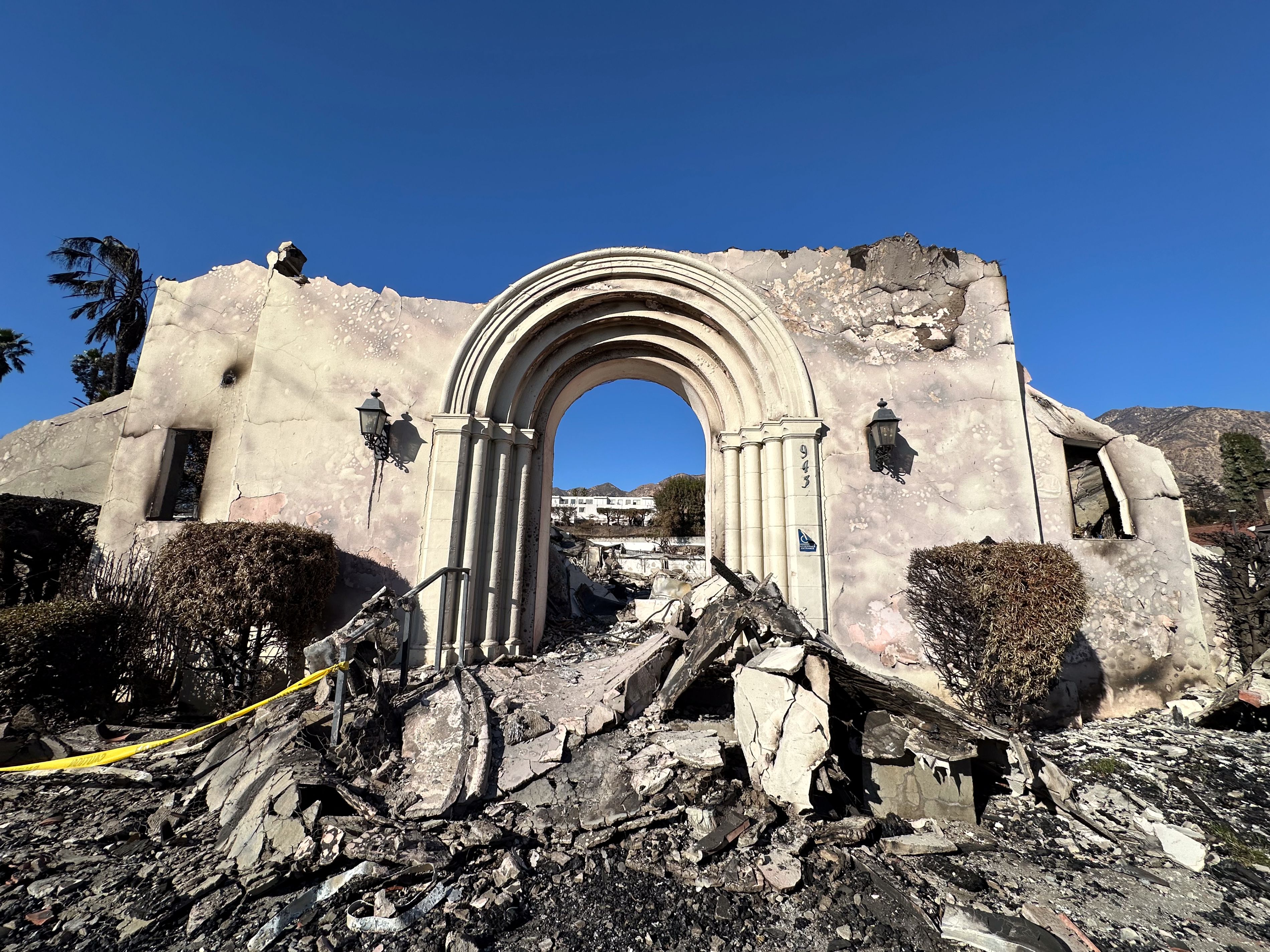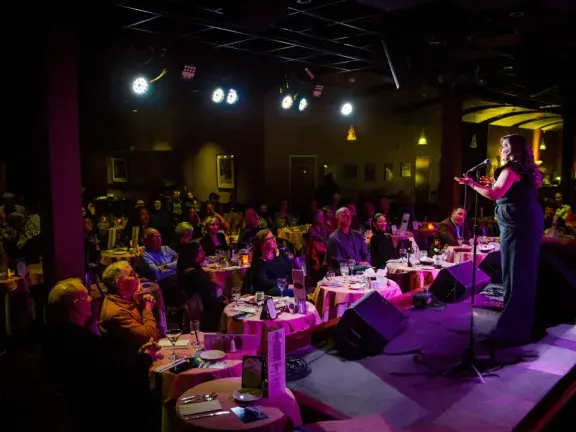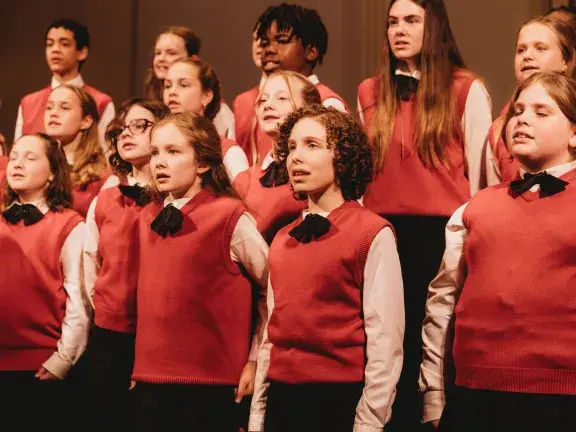
Register by October 17 to Secure Your Spot!
| Registration Type | Member Price |
|---|---|
| Early Bird Registration (Sept. 11-Oct.3) | $750 |
| General Registration (Oct. 4-Oct.17) | $850 |
| Registration Type | Member Price |
|---|---|
| Early Bird Registration (Sept. 11-Oct.3) | $750 |
| General Registration (Oct. 4-Oct.17) | $850 |
| Registration Type | Member Price | Non-Member Price |
|---|---|---|
| Early Bird Registration (Sept. 11-Oct. 3) | $750 | $850 |
| General Registration (Oct. 4-Oct.17) | $850 | $950 |
Not a member? We'd love to have you join us for this event and become part of the Chorus America community! Visit our membership page to learn more, and feel free to contact us with any questions at membership@chorusamerica.org.
| Registration Type | Non-Member Price |
|---|---|
| Early Bird Registration (Sept. 11-Oct. 3) | $850 |
| General Registration (Oct. 4-Oct.17) | $950 |
Think you should be logged in to a member account? Make sure the email address you used to login is the same as what appears on your membership information. Have questions? Email us at membership@chorusamerica.org.
| Registration Type | Price |
|---|---|
| Individual Session | $30 each |
| All Four (4) Sessions | $110 |
*Replays with captioning will remain available for registrants to watch until November 1, 11:59pm EDT.
Member Professional Development Days are specially designed for Chorus America members. If you're not currently a member, we'd love to welcome you to this event, and into the Chorus America community! Visit our membership page to learn more about becoming a member of Chorus America, and please don't hesitate to reach out to us with any questions at membership@chorusamerica.org.
| Registration Type | Price |
|---|---|
| Individual Session | $30 each |
| All Four (4) Sessions | $110 |
*Replays with captioning will remain available for registrants to watch until November 1, 11:59pm EDT.
| Registration Type | Price |
|---|---|
| Individual Session | $30 each |
| All Four (4) Sessions | $110 |
*Replays with captioning will remain available for registrants to watch until November 1, 11:59pm EDT.
Member Professional Development Days are specially designed for Chorus America members. If you're not currently a member, we'd love to welcome you to this event, and into the Chorus America community! Visit our membership page to learn more about becoming a member of Chorus America, and please don't hesitate to reach out to us with any questions at membership@chorusamerica.org.
Choral organizations are known for keeping community at the heart of their mission. But when local emergencies, or natural disasters strike, choral organizers must pivot quickly to providing guidance and support for their members and staff. Often they also offer the broader community healing and hope in unexpected ways.

When Hurricane Helene made landfall in Florida on September 26, 2024, few anticipated the devastation it would bring. Though hurricanes are common in Florida and coastal areas of the U.S., Helene was the deadliest hurricane to strike the mainland United States since Hurricane Katrina in 2005. This rare event, and its subsequent rainfall, was unprecedented, and mountain communities across North Carolina, Tennessee, and Virginia were vastly unprepared.
In Waynesville, North Carolina, about 20 miles west of Asheville, catastrophic flooding caused by the storm’s heavy rains and widespread power outages upended daily life and quickly derailed any existing plans for Voices in the Laurel Youth Choirs, which had been preparing to perform with the Charlotte Symphony just a week later. “The first few days we didn’t really know the extent of the damage, nor could we get in touch with anyone else because we had no internet and no phones,” says Martha Brown, founding artistic director of the chorus. “About three days in, a friend had stopped by and said that there was cell coverage. We live in the mountains, and there is a high school up high. My operations manager and I went up to [the school parking lot] and called every member in our organization, or tried to, just to check in. We were just concerned if everybody was okay.” It wasn’t until the following Thursday that they confirmed every member was safe. Their rehearsal space had escaped flooding, but with the power out, it remained unusable and left Brown and her staff unable to survey any property damage until the middle of the following week. Some areas of the county, Brown says, were completely destroyed. When the singers were finally able to gather, they met at a local church to reflect and reconnect. Thankfully, none of the choristers lost their homes, but many families lost income as the storm’s effects shut down businesses throughout Asheville, where many of the children’s parents and caregivers make their livelihoods. That first gathering at the church became something deeper than a check-in; it gave the youth a way to reunite and share emotional support. Some of the children brought along siblings and friends, easing the burden of childcare for adults who were assisting in recovery and cleanup efforts and highlighting how much the community had been stretched thin. Even at a young age, these singers understood the scale of the loss others had faced. Many expressed their desire to help families who had lost their homes and possessions to the floods. While aid organizations provided food, water, blankets, and temporary shelter, the singers of Voices in the Laurel wanted to focus on the needs of the youngest members of their community. Their response was simple but heartfelt: They began collecting toys, books, and educational supplies to give to other children who had been displaced. From this, “Boxes of Sunshine” was born. These boxes were care packages filled with games, art supplies, toys, and small comforts for kids between the ages of 4 and 14. Many of the items were sourced from local businesses that had been damaged by the storm, creating a ripple effect of support across the region. Later, the chorus hosted a fundraiser, “Sing for Joy,” using their voices to raise additional funds for the community’s ongoing needs. When rehearsals were finally able to take place, Voices in the Laurel took another step: offering scholarships to cover tuition for students whose families were financially impacted. Working with school principals, Brown and her team were able to aid 100 children who were identified by local school principals. So far, the organization has collected $25,000 to support local families.

A couple of hours away, in Bristol, Tennessee, the staff, leadership, and singers of Mountain Empire Children’s Choral Academy (MECCA) were lending a hand to their local community. MECCA serves over 150 children ranging in ages from 6–18 in eastern Tennessee and southwestern Virginia, and while none of the choristers lost their homes, the close-knit nature of the region meant that everyone knew someone who was affected. “We talked about [volunteering] as a group, but we really didn’t need to because it seemed like everybody was already involved in some way,” says Jane DeLoach Morison, artistic director of MECCA. “Kids really rallied around their communities and did a lot of volunteer work, cleaning out, collecting food, collecting clothing, distributing things like that to people in their community that were in need.” Led by high-school-aged members, MECCA’s choristers solicited and distributed care items to the communities where they lived. This focus on community support became so important to the singers that staff had to make adjustments to the rehearsal agenda. “We had to extend our announcement time in our choirs so all of these kids could solicit their causes and their different communities, say what they were doing, and ask for other people to help” Morison recalls. “It’s been great.” While much of the response was to the tangible needs of friends, neighbors, and loved ones, MECCA was able to provide something more intangible as well: an opportunity for people to come together and experience the healing power of music. Morison estimates the organization’s ensembles have performed 12–15 concerts since the hurricane last September. “We have noticed that our attendance has been huge,” she says. “It’s definitely meeting a need.” To continue responding to that need, MECCA has been full steam ahead with its rehearsals while still carving out space to care for its members. “We get a lot done and the choirs work really hard and they sound really great,” says Morison. “But we’re a very nurturing organization. It’s just a really great space of support for these kids, and the love they show to each other is really inspiring.” While the road to recovery is ongoing, the music—and the community—continue throughout the region
Just four months after Hurricane Helene made landfall, disaster struck in Southern California. In January, the Eaton and Palisades fires in Los Angeles County wreaked havoc across the urban area and its neighborhoods. For the Los Angeles Children’s Chorus (LACC), based in Pasadena but serving singers from across the region, the disruption was immediate. “Our whole entire office was covered in ash,” recalls Susan Miller Kotses, LACC’s executive director. “We’re in a very old building and the ash kind of seeped in through the old windows. We rent space from a church, so every day we had to clean everything in order to make it a safe place to sing and exist. Even though we weren’t in a burn zone, we were adjacent.” While their building remained intact, the toll on the LACC community was severe. Eighteen families in the chorus community fully lost their homes, and many more were forced to evacuate. Some still haven’t returned. Meanwhile, less than four miles away, the Pasadena Chorale lost its home entirely when its rehearsal space at the Altadena Community Church was destroyed by the fire. “We were there for 15 years,” says founding artistic and executive director Jeffrey Bernstein. “The church was our home. It was a performance space that was magnificent, and it really grew with us. It was like a family member, almost, in that way. So when we lost the church, it was a great big shock.” The loss of its rehearsal space left the ensemble scrambling. Ten families across the organization lost their homes, with a couple dozen more displaced or disrupted. Several of those affected were Pasadena Chorale staff members, including Bernstein himself. “The first thing I knew was that we had to keep singing,” Bernstein recalls. “Community choruses mean a lot to the people who sing in them. And it’s a support system, and it’s friends, and it’s an activity, and it’s a thing that gets you out of the rest of your daily life. And I knew that we needed that more than ever."
Southern California has a rich choral community, and within a day Bernstein had secured a space for the ensemble’s rehearsal retreat, which was meant to take place in just 72 hours. “I wrote to the choir Wednesday night and said ‘We’re on. Of course, if you can’t, I completely understand.’” 50 singers showed up for a rehearsal retreat that Bernstein describes as cathartic, painful, and beautiful. “There was a real quiet joy in seeing each other again,” he says. “When I look back on it now, I realize how little we all knew about because we were all in shock. One of our choristers is a therapist, and he asked me if he could lead a stress-relieving exercise, so we opened with that. […] Some people were already crying from the release in that moment. And then we started singing.” LACC also acted quickly to support its singers. The day after the fires began, the organization sent a group email to its entire community, prompting families to report evacuations and losses. The chorus delayed its programming by a week and stayed in close contact with those affected. “Pretty quickly, we found good resources that we were able to share from the county,” Miller Kotses says. That strong sense of community helped carry LACC through. “It’s a very cohesive community. It’s a very caring community,” she says.

The week rehearsals were set to resume, LACC hosted a gathering for choristers and families. “We divided the older and younger choristers and their families and provided therapists to lead group work and offer private spaces if people needed to speak with them one-on-one,” Miller Kotses recalls. “We had a local restaurant donate a meal and provide snacks. Some of the older choristers sang, and it was a really beautiful time just to gather and reconnect with who we are.” When rehearsals resumed the following week, staff greeted families who had lost their homes with new music bags and new music as they arrived. LACC also launched a fire relief fund, which has now raised over $60,000. The organization continues to post families’ GoFundMe links on its website to support those still recovering. The Pasadena Chorale’s section leaders formed an internal fire relief committee, also raising money via GoFundMe. Additionally, they created a spreadsheet for chorus members to post needs and be matched with other members who could provide those resources. Displaced singers from the middle school ensemble assembled care packages, filling bags with socks, toothpaste, and sweaters. “They put together dozens and dozens of them to give to shelters, but they also brought them for chorale members,” says Bernstein. “They’re 13 years old, and their first impulse was, ‘How do we help other people?’” Not every ensemble was directly affected by the fires, but some, like VOX Femina, saw an opportunity to mobilize their resources in support of those who were. The ensemble’s annual cabaret fundraiser was scheduled for January 26, weeks after the worst of the fire activity, but the timing didn’t sit right. “Everybody was thinking about the fire victims,” says executive director Rebecca Wink. Instead of asking for support for themselves, the members of VOX made a decisive pivot: They transformed the evening into a benefit for fire relief, donating 100% of proceeds—about $5,000—to the California Community Foundation’s Wildfire Relief Fund. The gesture resonated, and the event drew friends, colleagues, and members of the broader L.A. community, including fire victims. “It was a very emotional time; it was still very new and very raw,” says Wink. “I remember one person putting their hand on my shoulder and saying, ‘We really needed this.’” The performance gave people a reason to gather, which was an experience that might have otherwise felt frivolous or out of place so soon after such devastation. “It probably wouldn’t have occurred to them to go out for a show,” says Wink. “But they went because of what it was raising money for. Music is so nourishing, and it ended up being really powerful.” Stories like these—of generosity, quick pivots, and community resilience—underscore just how vital the arts are in times of crisis. But they also raise an important question: How can arts organizations be better prepared before disaster strikes?

The National Coalition for Arts Preparedness and Emergency Response (NCAPER) is a voluntary coalition of public and private agencies established in 2006 to support artists and arts organizations during crises. These crises include both human-caused events, such as gun violence, and unexpected events like weather disasters. NCAPER connects arts organizations with critical resources, support, and planning education, and also advocates for those affected by emergencies. In collaboration with Performing Arts Readiness, the coalition also develops educational webinars that organizations can access for disaster and emergency planning. “We recognize—and try to encourage conversation about—the fact that a lot of the practices and concepts we [promote] are not just about natural and environmental disasters,” explains Mollie Quinlan-Hayes, NCAPER’s fund development and program officer. “They’re also about human-caused disasters, whether those are acts of violence, cyberattacks, or other sudden and unexpected events. We’re working now in partnership with an organization whose co-executive director just died suddenly.” NCAPER developed a toolkit, Arts Organizations at a Crossroads, to help organizations navigate challenges like mergers, suspending operations, or archiving programs. Originally created during the COVID-19 pandemic, the toolkit is now being updated to reflect ongoing uncertainty in federal arts and emergency funding. Making an effort to discuss disaster and crisis planning ahead of an event is crucial to weather any storm or setback. Building an internal culture that can be adaptable is the foundation of any crisis planning, she says. “A lot of people during COVID learned a lot,” she says. “So part of what we do is say: Remember how you operated then? Build that muscle, that internal culture and muscle memory, about how you suddenly pivoted programs, how you stayed relevant to your community. What are the things you did in that time that can serve you well in other types of crises?” Quinlan-Hayes shared several best practices for arts organizations preparing for emergencies:
Choral organizations will continue to face emerging challenges that cut across the industry. By giving members and staff a sense of agency and purpose during chaotic and traumatic times, organizers can safeguard not only the future of their own programs, but also uplift the wider community in meaningful, lasting ways. In times of crisis, the resilience of choral organizations lies not only in their ability to adapt, but in their commitment to care for their singers, their communities, and their mission. Whether facing wildfires, floods, or unexpected tragedies, the power of a chorus extends beyond performance. With preparation, connection, and compassion, choral leaders can create a sense of stability and belonging that endures, even when everything else is uncertain.
Christine S. Escobar is a freelance writer living in the Chicago area. She is the founder and editor of www.greenparentchicago.com. Kaeli Todd is managing editor of The Voice.